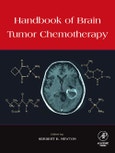Treatment of patients with a brain tumor remains one of the most challenging and difficult areas of modern oncology. Recent advances in the molecular biology of these neoplasms have improved our understanding of the malignant phenotype and have lead to the development of novel forms of chemotherapy, including "targeted agents. The Handbook of Brain Tumor Chemotherapy reviews the state-of-the-art of chemotherapy development and clinical treatment of patients with this devastating disease.
Handbook of Brain Tumor Chemotherapy offers a unique cutting-edge compendium of basic science and clinical information on the subject of brain tumor chemotherapy, reviewing what has been accomplished thus far and how the field will continue to evolve with the development of more specific and efficacious chemotherapeutic agents. This book represents the most complete single-volume resource available for information on the subject of brain tumor chemotherapy.
Table of Contents
I. Pharmacology and Clinical Applications.1. Overview of Brain Tumor Epidemiology and Histopathology.
2. Clinical Pharmacology of Brain Tumor Chemotherapy.
3. Chemotherapy and Anti-Epileptic Drug Interactions.
4. Brain Tumor Models for Cancer Therapy.
5. Microarray Analysis and Proteomic Approaches to Drug Development.
6. Chemotherapy Resistance.
7. Clinical Trial Design and Implementation.
II. Molecular Biology and Basic Science.
8. Molecular Genetics of Brain Tumors An Overview
9. Regulation of the Cell Cycle and Interventional Developmental Therapeutics.
10. Apoptosis Pathways and Chemotherapy.
11. Growth Factor Signaling Pathways and Receptor Tyrosine Kinase Inhibitors.
12. Ras Signaling Pathways and Farnesyl Transferase Inhibitors.
13. PI3-Kinase, PKB/Akt, mTOR, and Internal Signaling Pathways.
14. Tumor Invasiveness and Anti-invasion Strategies.
15. Mechanisms of Angiogenesis in Brain Tumors and their Translation into Therapeutic Anti-tumor Strategies.
16. Biology of the Blood-Brain and Blood-Brain Tumor Barriers.
III. Innovative Approaches to Chemotherapy Delivery.
17. Intra-Arterial Chemotherapy.
18. Blood-Brain Barrier Disruption Chemotherapy.
19. Interstitial Chemotherapy and Polymer-Drug Delivery.
20. Intratumoral Administration and Convection-Enhanced Delivery.
21. Marrow Ablative Chemotherapy with Hematopoietic Stem Cell Rescue.
22. CSF Dissemination of Primary Brain Tumors.
23. Chemotherapy-Activating Gene Therapy.
IV. Chemotherapy of Specific Tumor Types.
24. Chemotherapy of High-Grade Astrocytomas.
25. Chemotherapy of Low-Grade Astrocytomas.
26. Chemotherapy of Oligodendrogliomas.
27. Chemotherapy of Oligoastrocytomas.
28. Chemotherapy of Primary Central Nervous System Lymphomas.
29. Chemotherapy of Medulloblastoma.
30. Chemotherapy of Ependymoma.
31. Chemotherapy of Glioneuronal Tumors.
32. Chemotherapy of Pineal Parenchymal Tumors.
33. Current Therapeutic Management Strategies for Primary Intracranial Germ Cell Tumors.
34. Chemotherapy of Menigiomas.
35. Chemotherapy for Brain Metasteses.
36. The Role of Chemotherapy in Pediatric Gliomas.








